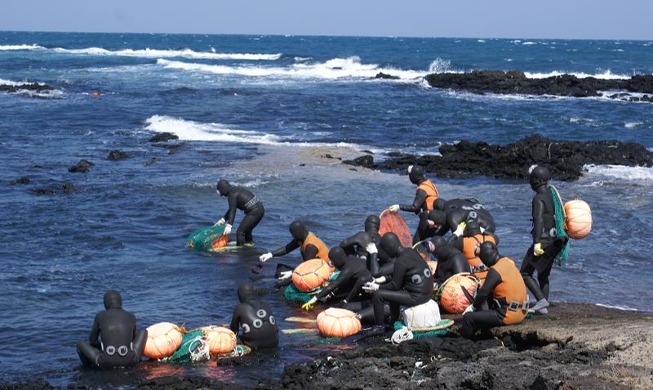- 한국어
- English
- 日本語
- 中文
- العربية
- Español
- Français
- Deutsch
- Pусский
- Tiếng Việt
- Indonesian

Four traditional systems of agriculture and fisheries last month received recognition as Globally Important Agricultural Heritage Systems of the Food and Agriculture Organization (FAO) of the United Nations. Shown is a statue of a haenyeo (female diver) of Jeju Island unveiled on Oct. 16 at the opening of the Food and Agriculture Museum and Network in Rome. (FAO)
By Margareth Theresia
Four systems of traditional agriculture and fisheries have received certification as Globally Important Agricultural Heritage Systems (GIAHS) of the Food and Agriculture Organization (FAO) of the United Nations.
The Ministry of Oceans and Fisheries and the Ministry of Agriculture, Food and Rural Affairs on Nov. 2 said the FAO at its headquarters in Rome on Oct. 31 registered the four as GIAHS: fishing by haenyeo (female divers) on Jeju Island; clam fishing using hand nets in the Seomjingang River running through Hadong-gun County, Gyeongsangnam-do Province, and Gwangyang, Jeollabuk-do Province; bamboo weir fishing in the Namhae Jijok Strait; and the traditional mountain farming system of the pine forest Geumgangsong in Uljin-gun County, Gyeongsangbuk-do Province.
As an international certification system run by the FAO, GIAHS support traditional agricultural systems, protection of regional biodiversity and sustainable use.
A combined 102 agricultural and fisheries heritage sites in 29 countries are designated GIAHS. Korea now has nine on the list -- six agricultural and three fisheries -- to rank third in the world after China and Japan.
The other five GIAHS in Korea are are the batdam agricultural system in Jeju and traditional gudeljang irrigated rice terraces on Cheongsando Island in Wando-gun County, Jeollanam-do Province (2014); traditional tea agrosystem in Hadong-gun (2017); Geumsan traditional ginseng agricultural system in Geumsan-gun County, Chungcheongnam-do Province (2018); and bamboo field agricultural system in Damyang-gun County, Jeollanam-do (2020).
Meanwhile, the country donated a statue of a haenyeo symbolizing the spirit of the divers to the Food and Agriculture Museum and Network, which opened on Oct. 16 in Rome. A Korean fisheries official said the exhibition introduces not only the value of traditional female diving and the sustainability of haenyeo culture to the world, but is also an example of collaboration linked to the conservaton of GIAHS.
margareth@korea.kr
